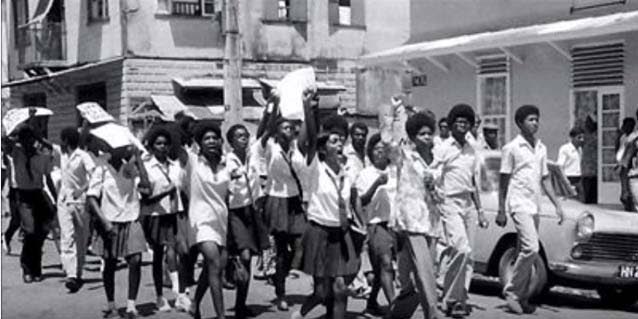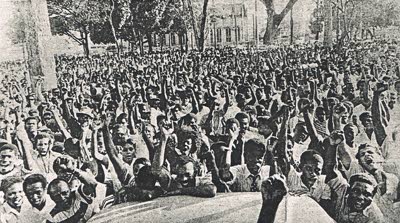‘We were dreamers’

“We were dreamers,” Raffique Shah said last week.
He spoke 50 years almost to the day after he and a group of other young army officers put their superiors under arrest
in a military coup that no one anticipated.
Shah was a 24-year-old lieutenant.
His co-conspirators were similarly young. They were all moved by the inequities and the resulting dissatisfaction pervading TT in 1970. This manifested itself in widespread, almost daily demonstrations involving what started as hundreds but quickly graduated to thousands of mostly young black people, pounding the streets and pavements, clenched fists punching the air, amidst shouts of “Black Power” and “Power to the people.”
Shah was assigned to Teteron Barracks, where his dissatisfaction was shared. The barracks, or “camp” as soldiers call it, became his second home. It would also serve as the platform from which he and 15 other soldiers would make a bold statement to the government when they seized control of the camp to express their disdain for authority – an authority that, ironically, they themselves represented.
The army mutiny would end weeks of public demonstrations and incidents that led to a state of emergency declared on April 21, 1970, and pushed TT into deeper waters of a military rebellion. There was a standoff involving loyal soldiers occupying the entry to Chaguaramas and the mutineers holed up inside the camp with with a number of civilians who were virtual hostages.
The 1970 revolution was indeed a turbulent chapter in TT’s history when issues of race relations and social inequities assumed full focus.
Today while Shah is able to look at his exploits in a more critical light, describing himself and others as “dreamers,” engrossed in their idealism as youths, he maintains that the lessons learned from the insurrection remain more relevant today than ever before.

In an interview with Sunday Newsday, Shah recalled his thoughts as a young soldier at the time, the factors that led to the mutiny and how much has changed in TT in the 50 years since the revolution.
Despite being a military man, he felt the need to bring about change within the defence force, then only eight years old.
He said among the issues that led to the revolt was the poor selection process for commanding officers, who he felt did not take their duties seriously.
“We were looking to build a utopia, looking to build perfect things, not understanding, at the age of 24, that there is no perfect society, or perfect army or perfect anything in the world. But there were many things going wrong in the regiment at that time.
The common theme was the non-professional approach to the army. They were quite happy, adorning themselves with their uniforms and quite literally doing nothing. The younger officers wanted to have a very professional regiment, and that opportunity did not exist.”
Shah said he and other soldiers were aware of the tense atmosphere in TT at the time which gave rise to the Black Power movement and organisations pushing for social change.
“In the aftermath of independence there were very little movements towards establishing some equity in terms of who controlled the heights of the economy and who had access to jobs in commerce, especially for middle and upper-level management. One of the big things that remained a problem in 1970 was that black people in banks and finance houses at the time were few and far between.”
Despite more conventional methods to bring about the desired change in the regiment, through formal reports and discussions with senior officers, Shah said he felt the efforts were futile.
What eventually triggered his decision to take a more forceful approach was the detention of several trade unionists who were rounded up by police on the night of April 20.
The declaration of a state of emergency by Prime Minister Dr Eric Williams was the final catalyst that prompted Shah to act.
“When we woke up on the morning of April 21 and realised there was a state of emergency and they called in the army, we didn’t want the government to use the might of the soldiers against the people.”
In the minutes that followed, Shah and fellow junior officer Rex Lassalle hastily rounded up 15 other like-minded soldiers to their cause.
What happened next would stay with Shah forever. He remembers the fear he felt as he and Lassalle confronted their superior officers at gunpoint.
“One thing we all agreed on was there would be no bloodshed. We didn’t want to kill anyone.
“It wasn’t part of our culture as Trinidadians to have bloodshed. We wanted to show we meant business, but we didn’t want to have to shoot anyone.
“We looked around for the commander at the time, who was Col Stanley Johnson, but he was nowhere to be found. So we had to settle for the second-in-command, who was Maj Christopher. He happened to be in an open area with one of our friends, a junior captain.
“I had a rifle with only two rounds of ammunition and so did Lassalle. We approached the second-in-command and told him, ‘Sir, you’re under arrest.’
“He was shocked and I was a little shocked myself. I was afraid, but what a soldier is taught is to overcome fear. I didn’t know what was going to happen – here I am, going to arrest my commanding officer.”
A silence fell over the officers in the room. The major tried to grab the rifle from Shah and another officer struggled with Lassalle for his weapon. Shah and Lassalle’s weapons were accidentally discharged, barely missing Christopher’s head.
Eventually the commanding officers overpowered both men and put them under arrest.
But this was short-lived, as the gunfire alerted the other mutineers, who stormed the room, overpowered the officers and freed Lassalle and Shah.
“We did it so hurriedly we didn’t have a signal for when to strike. But the others heard the gunfire and took that as the signal, not knowing the gun accidentally went off from my wrestling with Christopher.”
Within 30 minutes Teteron Barracks and its armoury – consisting of high-calibre ammunition, plastic explosives, rifles and anti-tank rockets – were at the disposal of Shah and his mutineers.
Shah said the next course of action for the mutineers was to move into Port of Spain. This part of their plan was quickly foiled by the coast guard, who set up roadblocks along the way.

Comments
"‘We were dreamers’"